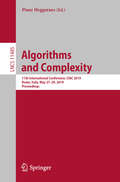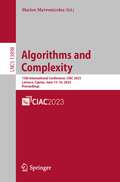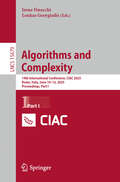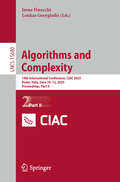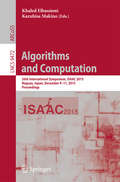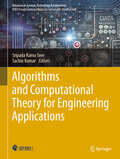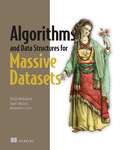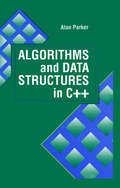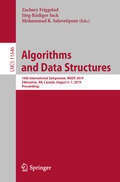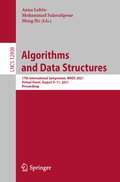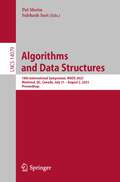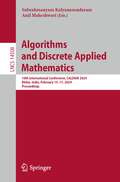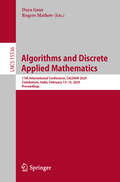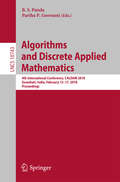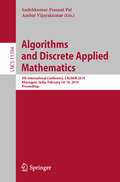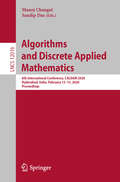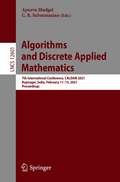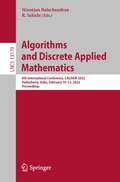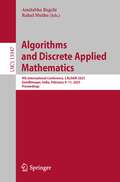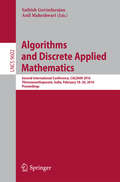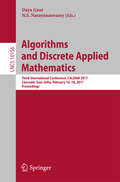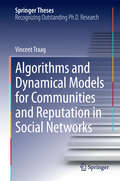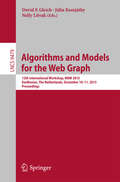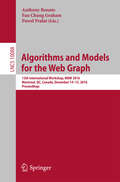- Table View
- List View
Algorithms and Complexity: 11th International Conference, CIAC 2019, Rome, Italy, May 27–29, 2019, Proceedings (Lecture Notes in Computer Science #11485)
by Pinar HeggernesThis book constitutes the refereed conference proceedings of the 11th International Conference on Algorithms and Complexity, CIAC 2019, held in Rome, Italy, in May 2019. The 30 full papers were carefully reviewed and selected from 95 submissions. The International Conference on Algorithms and Complexity is intended to provide a forum for researchers working in all aspects of computational complexity and the use, design, analysis and experimentation of efficient algorithms and data structures. The papers present original research in the theory and applications of algorithms and computational complexity.
Algorithms and Complexity: 13th International Conference, CIAC 2023, Larnaca, Cyprus, June 13–16, 2023, Proceedings (Lecture Notes in Computer Science #13898)
by Marios MavronicolasThis book constitutes the refereed proceedings of the 13th International Conference on Algorithms and Complexity, CIAC 2023, which took place in Larnaca, Cyprus, during June 13–16, 2023. The 25 full papers included in this book were carefully reviewed and selected from 49 submissions. They cover all important areas of research on algorithms and complexity such as algorithm design and analysis; sequential, parallel and distributed algorithms; data structures; computational and structural complexity; lower bounds and limitations of algorithms; randomized and approximation algorithms; parameterized algorithms and parameterized complexity classes; smoothed analysis of algorithms; alternatives to the worst-case analysis of algorithms (e.g., algorithms with predictions), on-line computation and competitive analysis, streaming algorithms, quantum algorithms and complexity, algorithms in algebra, geometry, number theory and combinatorics, computational geometry, algorithmic game theory and mechanism design, algorithmic economics (including auctions and contests), computational learning theory, computational biology and bioinformatics, algorithmic issues in communication networks, algorithms for discrete optimization (including convex optimization) and algorithm engineering.
Algorithms and Complexity: 14th International Conference, CIAC 2025, Rome, Italy, June 10–12, 2025, Proceedings, Part I (Lecture Notes in Computer Science #15679)
by Irene Finocchi Loukas GeorgiadisThe two-volume set LNCS 15679 and 15680 constitutes the refereed proceedings of the 14th International Conference on Algorithms and Complexity, CIAC 2025, held in Rome, Italy, during June 10–12, 2025.The 44 full papers included in these proceedings were carefully reviewed and selected from 110 submissions. They focus on all aspects of important venue for researchers working on computational complexity and the design, analysis, experimentation, and application of efficient algorithms and data structures.
Algorithms and Complexity: 14th International Conference, CIAC 2025, Rome, Italy, June 10–12, 2025, Proceedings, Part II (Lecture Notes in Computer Science #15680)
by Irene Finocchi Loukas GeorgiadisThe two-volume set LNCS 15679 and 15680 constitutes the refereed proceedings of the 14th International Conference on Algorithms and Complexity, CIAC 2025, held in Rome, Italy, during June 10–12, 2025.The 44 full papers included in these proceedings were carefully reviewed and selected from 110 submissions. They focus on all aspects of important venue for researchers working on computational complexity and the design, analysis, experimentation, and application of efficient algorithms and data structures.
Algorithms and Computation: 26th International Symposium, ISAAC 2015, Nagoya, Japan, December 9-11, 2015, Proceedings (Lecture Notes in Computer Science #9472)
by Khaled Elbassioni Kazuhisa MakinoThis book constitutes the refereed proceedings of the 26th InternationalSymposium on Algorithms and Computation, ISAAC 2015, held in Nagoya, Japan, inDecember 2015. The 65 revised full papers presented together with 3 invited talks were carefullyreviewed and selected from 180 submissions for inclusion in the book. The focusof the volume is on the following topics: computational geometry; datastructures; combinatorial optimization and approximation algorithms; randomizedalgorithms; graph algorithms and FPT; computational complexity; graph drawingand planar graphs; online and streaming algorithms; and string and DNAalgorithms.
Algorithms and Computational Theory for Engineering Applications (Advances in Science, Technology & Innovation)
by Sachin Kumar Sripada Rama SreeThis book goes deeply into the world of algorithms and computational theory and its astounding influence on numerous engineering areas. The book's carefully chosen content highlights the most recent studies, approaches, and real-world applications that are revolutionising engineering. The book is structured into distinct sections, each of which examines an important topic in computational theory and algorithms. The authors propose cutting-edge optimisation methods that revolutionise the way engineers approach engineering problems by allowing them to solve complicated issues quickly and effectively. The book illustrates the techniques and equipment used in the fields of data science and big data analytics to glean insightful information from enormous databases. Data visualisation, predictive modelling, clustering, and anomaly detection are a few examples of how algorithms are used to find patterns and trends that help engineers make well-informed decisions. Before being physically implemented, complex systems are built, tested, and optimised in the virtual environment thanks to computational modelling and simulation. The book examines numerical techniques, finite element analysis, computational fluid dynamics, and other simulation techniques to highlight how algorithms are changing engineering system design and performance optimisation. The book also delves into the intriguing field of robotics and control systems. The book's readers will learn about the algorithms that advance sensor fusion, intelligent control, path planning, and real-time systems, paving the way for innovations in autonomous driving, industrial automation, and smart cities. Readers will learn more about how algorithms and computational theory are modifying engineering environments, opening up new opportunities, and changing industries by examining the book's chapters. This book is a must-have for anyone looking to keep on top of the intersection of algorithms, computational theory, and engineering applications because of its concentration on practical applications and theoretical breakthroughs.
Algorithms and Data Structures for Massive Datasets
by Dzejla Medjedovic Emin TahirovicMassive modern datasets make traditional data structures and algorithms grind to a halt. This fun and practical guide introduces cutting-edge techniques that can reliably handle even the largest distributed datasets.In Algorithms and Data Structures for Massive Datasets you will learn: Probabilistic sketching data structures for practical problems Choosing the right database engine for your application Evaluating and designing efficient on-disk data structures and algorithms Understanding the algorithmic trade-offs involved in massive-scale systems Deriving basic statistics from streaming data Correctly sampling streaming data Computing percentiles with limited space resources Algorithms and Data Structures for Massive Datasets reveals a toolbox of new methods that are perfect for handling modern big data applications. You&’ll explore the novel data structures and algorithms that underpin Google, Facebook, and other enterprise applications that work with truly massive amounts of data. These effective techniques can be applied to any discipline, from finance to text analysis. Graphics, illustrations, and hands-on industry examples make complex ideas practical to implement in your projects—and there&’s no mathematical proofs to puzzle over. Work through this one-of-a-kind guide, and you&’ll find the sweet spot of saving space without sacrificing your data&’s accuracy. About the technology Standard algorithms and data structures may become slow—or fail altogether—when applied to large distributed datasets. Choosing algorithms designed for big data saves time, increases accuracy, and reduces processing cost. This unique book distills cutting-edge research papers into practical techniques for sketching, streaming, and organizing massive datasets on-disk and in the cloud. About the book Algorithms and Data Structures for Massive Datasets introduces processing and analytics techniques for large distributed data. Packed with industry stories and entertaining illustrations, this friendly guide makes even complex concepts easy to understand. You&’ll explore real-world examples as you learn to map powerful algorithms like Bloom filters, Count-min sketch, HyperLogLog, and LSM-trees to your own use cases. What's inside Probabilistic sketching data structures Choosing the right database engine Designing efficient on-disk data structures and algorithms Algorithmic tradeoffs in massive-scale systems Computing percentiles with limited space resources About the reader Examples in Python, R, and pseudocode. About the author Dzejla Medjedovic earned her PhD in the Applied Algorithms Lab at Stony Brook University, New York. Emin Tahirovic earned his PhD in biostatistics from University of Pennsylvania. Illustrator Ines Dedovic earned her PhD at the Institute for Imaging and Computer Vision at RWTH Aachen University, Germany. Table of Contents 1 Introduction PART 1 HASH-BASED SKETCHES 2 Review of hash tables and modern hashing 3 Approximate membership: Bloom and quotient filters 4 Frequency estimation and count-min sketch 5 Cardinality estimation and HyperLogLog PART 2 REAL-TIME ANALYTICS 6 Streaming data: Bringing everything together 7 Sampling from data streams 8 Approximate quantiles on data streams PART 3 DATA STRUCTURES FOR DATABASES AND EXTERNAL MEMORY ALGORITHMS 9 Introducing the external memory model 10 Data structures for databases: B-trees, Bε-trees, and LSM-trees 11 External memory sorting
Algorithms and Data Structures in C++ (Computer Science And Engineering Ser. #5)
by Alan ParkerAlgorithms and Data Structures in C++ introduces modern issues in the theory of algorithms, emphasizing complexity, graphs, parallel processing, and visualization. To accomplish this, the book uses an appropriate subset of frequently utilized and representative algorithms and applications in order to demonstrate the unique and modern aspects of the C++ programming language. What makes this book so valuable is that many complete C++ programs have been compiled and executed on multiple platforms. Each program presented is a stand-alone functional program. A number of applications that exercise significant features of C++, including templates and polymorphisms, is included. The book is a perfect text for computer science and engineering students in traditional algorithms or data structures courses. It will also benefit professionals in all fields of computer science and engineering.
Algorithms and Data Structures: 16th International Symposium, WADS 2019, Edmonton, AB, Canada, August 5–7, 2019, Proceedings (Lecture Notes in Computer Science #11646)
by Jörg-Rüdiger Sack Zachary Friggstad Mohammad R. SalavatipourThis book constitutes the refereed proceedings of the 16th International Symposium on Algorithms and Data Structures, WADS, 2019, held in Edmonton, AB, Canada, in August 2019. The 42 full papers presented together with 3 invited lectures, we carefully reviewed and selected from a total of 88 submissions. They present original research on the theory and application of algorithms and data structures in many areas, including combinatorics, computational geometry, databases, graphics, and parallel and distributed computing.
Algorithms and Data Structures: 17th International Symposium, WADS 2021, Virtual Event, August 9–11, 2021, Proceedings (Lecture Notes in Computer Science #12808)
by Anna Lubiw Mohammad SalavatipourThis book constitutes the refereed proceedings of the 17th International Symposium on Algorithms and Data Structures, WADS 2021, held in virtually in August 2021. The 47 full papers, presented together with two invited lectures, were carefully reviewed and selected from a total of 123 submissions. They present original research on the theory, design and application of algorithms and data structures.
Algorithms and Data Structures: 18th International Symposium, WADS 2023, Montreal, QC, Canada, July 31 – August 2, 2023, Proceedings (Lecture Notes in Computer Science #14079)
by Subhash Suri Pat MorinThis book constitutes the refereed proceedings of the 18th International Symposium on Algorithms and Data Structures, WADS 2023, held during July 31-August 2, 2023. The 47 regular papers, presented in this book, were carefully reviewed and selected from a total of 92 submissions. They present original research on the theory, design and application of algorithms and data structures.
Algorithms and Discrete Applied Mathematics: 10th International Conference, CALDAM 2024, Bhilai, India, February 15–17, 2024, Proceedings (Lecture Notes in Computer Science #14508)
by Anil Maheshwari Subrahmanyam KalyanasundaramThis book constitutes the refereed proceedings of the 10th International Conference on Algorithms and Discrete Applied Mathematics, CALDAM 2024, held in Bhilai, India during February 15–17, 2024. The 22 full papers included in this book were carefully reviewed and selected from 57 submissions. They were organized in topical sections as follows: Algorithms and Complexity; Computational Geometry; Discrete Applied Mathematics; Graph Algorithms; Graph Theory.
Algorithms and Discrete Applied Mathematics: 11th International Conference, CALDAM 2025, Coimbatore, India, February 13–15, 2025, Proceedings (Lecture Notes in Computer Science #15536)
by Daya Gaur Rogers MathewThis book constitutes the refereed proceedings of the 11th International Conference on Algorithms and Discrete Applied Mathematics, CALDAM 2025, held in Coimbatore, India, during February 13–15, 2025. The 30 full papers included in this book were carefully reviewed and selected from 89 submissions.The conference had papers in algorithms and complexity, discrete applied mathematics, computational geometry, graph theory, graph colouring, graph partition, and domination in graphs.
Algorithms and Discrete Applied Mathematics: 4th International Conference, CALDAM 2018, Guwahati, India, February 15-17, 2018, Proceedings (Lecture Notes in Computer Science #10743)
by B. S. Panda Partha P. GoswamiThis book constitutes the proceedings of the 4th International Conference on Algorithms and Discrete Applied Mathematics, CALDAM 2018, held in Guwahati, India, in February 2018. The 23 papers presented in this volume were carefully reviewed and selected from 68 submissions. They focus on topics related to efficient algorithms and data structures, their analysis (both theoretical and experimental). The mathematical problems arising thereof, and new applications of discrete mathematics, advances in existing applications and development of new tools for discrete mathematics.
Algorithms and Discrete Applied Mathematics: 5th International Conference, CALDAM 2019, Kharagpur, India, February 14-16, 2019, Proceedings (Lecture Notes in Computer Science #11394)
by Sudebkumar Prasant Pal Ambat VijayakumarThis book constitutes the proceedings of the 5th International Conference on Algorithms and Discrete Applied Mathematics, CALDAM 2019, held in Kharagpur, India, in February 2019. The 22 papers presented together with 3 invited papers in this volume were carefully reviewed and selected from 86 submissions. The conference had papers in the areas of algorithms, graph theory, combinatorics, computational geometry, discrete geometry, and computational complexity.
Algorithms and Discrete Applied Mathematics: 6th International Conference, CALDAM 2020, Hyderabad, India, February 13–15, 2020, Proceedings (Lecture Notes in Computer Science #12016)
by Manoj Changat Sandip DasThis book constitutes the proceedings of the 6th International Conference on Algorithms and Discrete Applied Mathematics, CALDAM 2020, held in Hyderabad, India, in February 2020. The 38 papers presented together with 2 invited talks in this volume were carefully reviewed and selected from 102 submissions. The papers are organized in topical sections on graph algorithms, graph theory, combinatorial optimization, distributed algorithms, combinatorial algorithms, and computational complexity.
Algorithms and Discrete Applied Mathematics: 7th International Conference, CALDAM 2021, Rupnagar, India, February 11–13, 2021, Proceedings (Lecture Notes in Computer Science #12601)
by Apurva Mudgal C. R. SubramanianThis book constitutes the proceedings of the 7th International Conference on Algorithms and Discrete Applied Mathematics, CALDAM 2021, which was held in Rupnagar, India, during February 11-13, 2021. The 39 papers presented in this volume were carefully reviewed and selected from 82 submissions. The papers were organized in topical sections named: approximation algorithms; parameterized algorithms; computational geometry; graph theory; combinatorics and algorithms; graph algorithms; and computational complexity.
Algorithms and Discrete Applied Mathematics: 8th International Conference, CALDAM 2022, Puducherry, India, February 10–12, 2022, Proceedings (Lecture Notes in Computer Science #13179)
by Niranjan Balachandran R. InkuluThis book constitutes the proceedings of the 8th International Conference on Algorithms and Discrete Applied Mathematics, CALDAM 2022, which was held in Puducherry, India, during February 10-12, 2022. The 24 papers presented in this volume were carefully reviewed and selected from 80 submissions. The papers were organized in topical sections named: graph theory, graph algorithms, computational geometry, algorithms and optimization.
Algorithms and Discrete Applied Mathematics: 9th International Conference, CALDAM 2023, Gandhinagar, India, February 9–11, 2023, Proceedings (Lecture Notes in Computer Science #13947)
by Amitabha Bagchi Rahul MuthuThis book constitutes the proceedings of the 9th International Conference on Algorithms and Discrete Applied Mathematics, CALDAM 2023, which was held in Gandhinagar, India, during February 9-11, 2023.The 32 papers presented in this volume were carefully reviewed and selected from 67 submissions. The papers were organized in topical sections named: algorithms and optimization; computational geometry; game theory; graph coloring; graph connectivity; graph domination; graph matching; graph partition and graph covering.
Algorithms and Discrete Applied Mathematics: Second International Conference, CALDAM 2016, Thiruvananthapuram, India, February 18-20, 2016, Proceedings (Lecture Notes in Computer Science #9602)
by Sathish Govindarajan Anil MaheshwariThis book collects the refereed proceedingsof the Second International Conference on Algorithms and Discrete AppliedMathematics, CALDAM 2016, held in Thiruvananthapuram, India, in February 2016. The volume contains 30 full revised papers from 90 submissions along with 1invited talk presented at the conference. The conference focuses on topicsrelated to efficient algorithms and data structures, their analysis (boththeoretical and experimental) and the mathematical problems arising thereof,and new applications of discrete mathematics, advances in existing applicationsand development of new tools for discrete mathematics.
Algorithms and Discrete Applied Mathematics: Third International Conference, CALDAM 2017, Sancoale, Goa, India, February 16-18, 2017, Proceedings (Lecture Notes in Computer Science #10156)
by Daya Gaur N. S. NarayanaswamyThis book constitutes the proceedings of the Third International Conference on Algorithms and Discrete Applied Mathematics, CALDAM 2017, held in Goa, India, in February 2017. The 32 papers presented in this volume were carefully reviewed and selected from 103 submissions. They deal with the following areas: algorithms, graph theory, codes, polyhedral combinatorics, computational geometry, and discrete geometry.
Algorithms and Dynamical Models for Communities and Reputation in Social Networks (Springer Theses)
by Vincent TraagA persistent problem when finding communities in large complex networks is the so-called resolution limit. This thesis addresses this issue meticulously, and introduces the important notion of resolution-limit-free. Remarkably, only few methods possess this desirable property, and this thesis puts forward one such method. Moreover, it discusses how to assess whether communities can occur by chance or not. One aspect that is often ignored in this field is treated here: links can also be negative, as in war or conflict. Besides how to incorporate this in community detection, it also examines the dynamics of such negative links, inspired by a sociological theory known as social balance. This has intriguing connections to the evolution of cooperation, suggesting that for cooperation to emerge, groups often split in two opposing factions. In addition to these theoretical contributions, the thesis also contains an empirical analysis of the effect of trading communities on international conflict, and how communities form in a citation network with positive and negative links.
Algorithms and Models for Network Data and Link Analysis
by François Fouss Marco Saerens Masashi ShimboNetwork data are produced automatically by everyday interactions - social networks, power grids, and links between data sets are a few examples. Such data capture social and economic behavior in a form that can be analyzed using powerful computational tools. This book is a guide to both basic and advanced techniques and algorithms for extracting useful information from network data. The content is organized around 'tasks', grouping the algorithms needed to gather specific types of information and thus answer specific types of questions. Examples include similarity between nodes in a network, prestige or centrality of individual nodes, and dense regions or communities in a network. Algorithms are derived in detail and summarized in pseudo-code. The book is intended primarily for computer scientists, engineers, statisticians and physicists, but it is also accessible to network scientists based in the social sciences. Matlab/Octave code illustrating some of the algorithms will be available at: http://www. cambridge. org/9781107125773.
Algorithms and Models for the Web Graph: 12th International Workshop, WAW 2015, Eindhoven, The Netherlands, December 10-11, 2015, Proceedings (Lecture Notes in Computer Science #9479)
by David F. Gleich Júlia Komjáthy Nelly LitvakThis book constitutesthe proceedings of the 12th International Workshop on Algorithms and Models forthe Web Graph, WAW 2015, held in Eindhoven, The Netherlands, in December 2015. The 15 fullpapers presented in this volume were carefully reviewed and selected from 24submissions. They are organized in topical sections named: properties of largegraph models, dynamic processes on large graphs, and properties of PageRank onlarge graphs.
Algorithms and Models for the Web Graph: 13th International Workshop, WAW 2016, Montreal, QC, Canada, December 14–15, 2016, Proceedings (Lecture Notes in Computer Science #10088)
by Anthony Bonato Fan Chung Graham Paweł PrałatThis book constitutes the proceedings of the 13th International Workshop on Algorithms and Models for the Web Graph, WAW 2016, held in Montreal, QC, Canada, in December 2016. The workshop gathered the researchers who are working on graph- theoretic and algorithmic aspects of related complex networks, including social networks, citation networks, biological networks, molecular networks, and other networks arising from the Internet.
